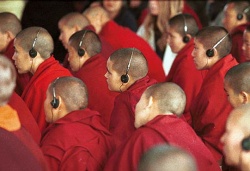Paccaya Sutta
Requisite Conditions
translated from the Pali by
Thanissaro Bhikkhu
Dwelling at Savatthi... "Monks, I will teach you dependent co-arising & dependently co-arisen phenomena. Listen & pay close attention. I will speak."
"As you say, lord," the monks replied. The Blessed One said:
"Now what is dependent co-arising? From birth as a requisite condition comes aging & death. Whether or not there is the arising of Tathagatas, this property stands — this regularity of the Dhamma, this orderliness of the Dhamma, this this/that conditionality. The Tathagata directly awakens to that, breaks through to that. Directly awakening & breaking through to that, he declares it, teaches it, describes it, sets it forth. He reveals it, explains it, makes it plain, & says, 'Look.' From birth as a requisite condition comes aging & death.
"From becoming as a requisite condition comes birth...
"From clinging/sustenance as a requisite condition comes becoming...
"From craving as a requisite condition comes clinging/sustenance...
"From feeling as a requisite condition comes craving...
"From contact as a requisite condition comes feeling...
"From the six sense media as a requisite condition comes contact...
"From name-&-form as a requisite condition come the six sense media...
"From consciousness as a requisite condition comes name-&-form...
"From fabrications as a requisite condition comes consciousness...
"From ignorance as a requisite condition come fabrications. Whether or not there is the arising of Tathagatas, this property stands — this regularity of the Dhamma, this orderliness of the Dhamma, this this/that conditionality. The Tathagata directly awakens to that, breaks through to that. Directly awakening & breaking through to that, he declares it, teaches it, describes it, sets it forth. He reveals it, explains it, makes it plain, & says, 'Look.' From ignorance as a requisite condition come fabrications. What's there in this way is a reality, not an unreality, not other than what it seems, conditioned by this/that. This is called dependent co-arising.
"And what are dependently co-arisen phenomena? Aging & death are dependently co-arisen phenomena: inconstant, compounded, dependently co-arisen, subject to ending, subject to passing away, subject to fading, subject to cessation.
"Birth is a dependently co-arisen phenomenon...
"Becoming is a dependently co-arisen phenomenon...
"Clinging/sustenance is a dependently co-arisen phenomenon...
"Craving is a dependently co-arisen phenomenon...
"Feeling is a dependently co-arisen phenomenon...
"Contact is a dependently co-arisen phenomenon...
"The six sense media are dependently co-arisen phenomena...
"Name-&-form is a dependently co-arisen phenomenon...
"Consciousness is a dependently co-arisen phenomenon...
"Fabrications are dependently co-arisen phenomena...
"Ignorance is a dependently co-arisen phenomenon: inconstant, compounded, dependently co-arisen, subject to ending, subject to passing away, subject to fading, subject to cessation. These are called dependently co-arisen phenomena.
"When a disciple of the noble ones has seen well with right discernment this dependent co-arising & these dependently co-arisen phenomena as they have come to be, it is not possible that he would run after the past, thinking, 'Was I in the past? Was I not in the past? What was I in the past? How was I in the past? Having been what, what was I in the past?' or that he would run after the future, thinking, 'Shall I be in the future? Shall I not be in the future? What shall I be in the future? How shall I be in the future? Having been what, what shall I be in the future?' or that he would be inwardly perplexed about the immediate present, thinking, 'Am I? Am I not? What am I? How am I? Where has this being come from? Where is it bound?' Such a thing is not possible. Why is that? Because the disciple of the noble ones has seen well with right discernment this dependent co-arising & these dependently co-arisen phenomena as they have come to be."

